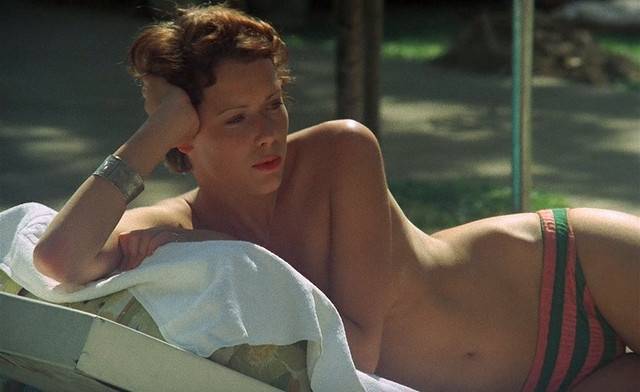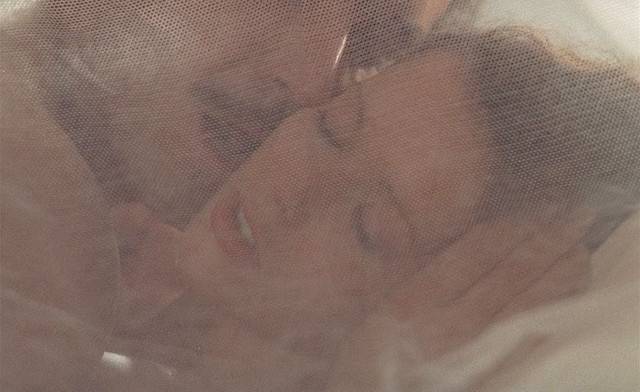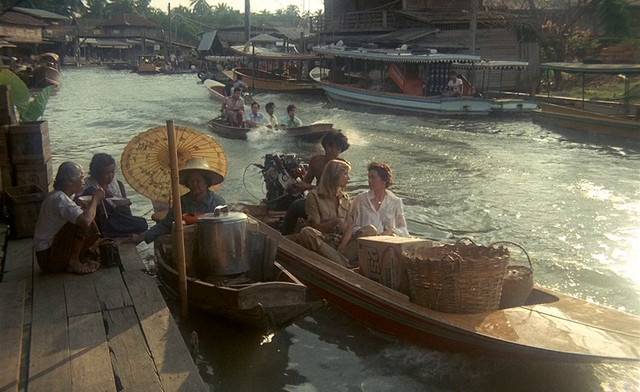
This was the first in a series of erotic films which were made possible by the increasingly liberal moral climate of the seventies and eighties and which enjoyed a success de scandale. The main character, Emmanuelle herself, is the attractive young wife of Jean, an older French diplomat in Bangkok, and the film chronicles her various sexual escapades. There is not, in fact, any real plot. Emmanuelle is seen having sex with her husband, with other men and, even more, with other women; lesbianism is, along with swimming, squash and cocktail parties, one of the main diversions of the bored ladies of Bangkok's French expatriate community.
Although this was one of the first productions of the mainstream cinema to deal with erotic subject-matter frankly, it is not particularly explicit. Much of the sexual action is implied, and what is shown directly is often shot from a distance. The eroticism of the film is softened by the way it is photographed. Outdoor scenes are shot in a blurry soft focus against a background of brilliant sunshine; indoor ones, by contrast, are generally dark or dimly lit. The leading actress, Sylvia Kristel, with her slim, boyish figure and the gentle beauty of her features, seems perfectly at home in this soft, unreal-seeming atmosphere. Nevertheless, there are still scenes that seem shocking even thirty years on. One of Emmanuelle's lovers, Marie-Ange, is a teenage girl only dubiously of the age of consent, something that seems to have caused less consternation in the seventies than it would do today. (The actress who played her was in fact eighteen, but the intention seems to have been to make the pigtailed, lollipop-sucking Marie-Ange a bisexual Lolita figure). Emmanuelle's Thai houseboy, aroused by the sight of her and her husband making love, pursues and has sex with one of the housemaids. It is never made clear whether or not this is an act of rape; the boundary between consensual and non-consensual sex is blurred in a manner which I found distasteful.
Like certain other Continental erotic films of this period, the 'Emmanuelle' series is marked by a certain pseudo-intellectual pretentiousness. This is particularly apparent in the second half of this film when the heroine, after being jilted by one of her lesbian lovers (the oddly named Bee), takes up with the elderly Mario, a man who, despite his grey hair and advancing years, fancies himself both as a lover and as a thinker. The rest of the film is frequently punctuated by Mario's thoughts on the meaning of life, carefully enunciated in a deep, gravelly voice, somewhere between an Old Testament prophet and an Orson Welles sherry commercial, which gives them the air of oracular pronouncements. Sex, in Mario's philosophy, ceases to be a taboo and becomes a duty. One owes it to oneself, and indeed to the world in general, to experience physical pleasure in as many ways as possible, with as many partners as possible, and to liberate oneself from all ways of thinking that might hinder one from this aim. The consequence of not doing so is that one will fail in one's solemn and sacred duty to Live Life To The Full.
It is this sort of Existentialism-Lite, Sartre meets Hugh Hefner, that makes the film seem so dated today, far more than do trivial period details such as Jean's sideburns or the garish lime-green paintwork of his sports car. This sort of cod-philosophy became one of the first casualties of the AIDS epidemic. If we watch 'Emmanuelle' today, it is not as an erotic experience, despite the undoubted charm of its heroine, and certainly not as an intellectual one, but as a slight, inadvertently amusing period piece



https://nitro.download/view/E7AC18DFBC25C63/Emmanuelle.1974.576p.BluRay.AAC.x264-HANDJOB.mkv
Language:French
Subtitles:English